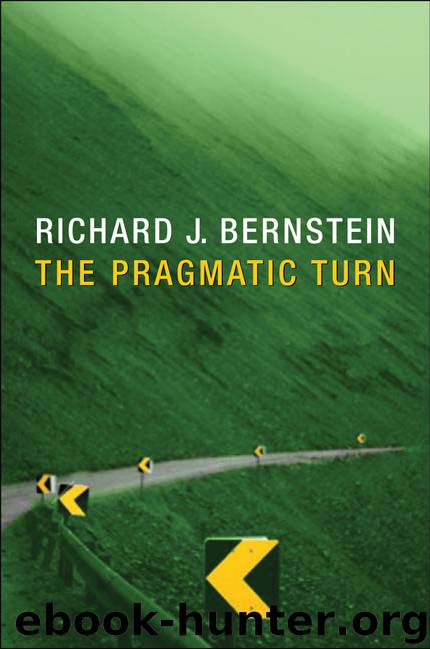Pragmatic Turn by Bernstein Richard J.;

Author:Bernstein, Richard J.;
Language: eng
Format: epub
Publisher: Wiley
Published: 2011-10-27T16:00:00+00:00
Brandom’s Contribution
I cannot do justice to Brandom’s complex and intricate pragmatic account of discursive justificatory practices, truth claims, and objectivity. His discussion of objectivity appears only at the end of chapter 8 in Making It Explicit, after more than 500 pages of densely textured argument – and what he has to say about objectivity largely depends on what has come before. I will limit myself to a few key points. Brandom leaves us with many issues that need further clarification, but he opens one of the most promising lines of inquiry for giving a strong pragmatic account of justification, truth, and objectivity – one that avoids both relativism and conventionalism. As I read Brandom, I see him – to use a Hegelian turn of phrase – drawing out the ‘truth’ implicit in the various attempts to articulate a pragmatic conception of justification, truth, sociality, and objectivity, and to reject what is misleading or mistaken.17 Let me give an informal statement of what Brandom seeks to show before turning to some details. Since the time when Charles Morris introduced his distinctions of syntax, semantics, and pragmatics, it has become a virtual dogma that there is a clear hierarchical ordering among these three disciplines. First comes syntax, then semantics, and finally pragmatics; pragmatics is dependent on semantics, and semantics is dependent on syntax. Brandom radically challenges this dogma and turns things upside down. His basic thesis is that pragmatics has explanatory primacy; that is, we can give an adequate account of semantics only from the perspective of a properly developed normative pragmatics. Brandom is well aware of the ambitiousness of his project – how it calls into question the dominant understanding of semantics. “The semantic explanatory strategy, which takes inference as its basic concept, contrasts with the one that has been dominant since the Enlightenment, which takes representation as its basic concept” (Brandom 1994, p. xvi). A major challenge of an inferential approach to semantics is to show that it can account for the representational dimension of semantic content. Stating Brandom’s project from a more traditional pragmatic perspective means the primacy of practice – knowing how to do something is the basis for knowing that. Consequently, the challenge Brandom faces is to develop a rich enough understanding of social discursive inferential practices that can do all the work that he claims it can do. He seeks to do this with an elaborate theory of deontic scorekeeping that highlights the role of human commitments and entitlements. These commitments and entitlements are themselves the products of human activity that generate norms. “Mastering this sort of norm-instituting social practice is a kind of practical know-how – a matter of keeping deontic score by keeping track of one’s own and others’ commitments and entitlements to those commitments, and altering that score in systematic ways based on performances each practitioner produces. The norms that govern the use of linguistic expressions are implicit in these deontic scorekeeping practices” (Brandom 1994, p. xiv).18
Even on the basis of this preliminary
Download
This site does not store any files on its server. We only index and link to content provided by other sites. Please contact the content providers to delete copyright contents if any and email us, we'll remove relevant links or contents immediately.
| Deconstruction | Existentialism |
| Humanism | Phenomenology |
| Pragmatism | Rationalism |
| Structuralism | Transcendentalism |
| Utilitarianism |
The remains of the day by Kazuo Ishiguro(7544)
Tools of Titans by Timothy Ferriss(6938)
The Black Swan by Nassim Nicholas Taleb(6185)
Inner Engineering: A Yogi's Guide to Joy by Sadhguru(5888)
Giovanni's Room by James Baldwin(5873)
The Way of Zen by Alan W. Watts(5790)
The Six Wives Of Henry VIII (WOMEN IN HISTORY) by Fraser Antonia(4786)
The Power of Now: A Guide to Spiritual Enlightenment by Eckhart Tolle(4749)
Astrophysics for People in a Hurry by Neil DeGrasse Tyson(4614)
Asking the Right Questions: A Guide to Critical Thinking by M. Neil Browne & Stuart M. Keeley(4567)
12 Rules for Life by Jordan B. Peterson(3725)
The Ethical Slut by Janet W. Hardy(3494)
Skin in the Game by Nassim Nicholas Taleb(3456)
Housekeeping by Marilynne Robinson(3397)
The Art of Happiness by The Dalai Lama(3378)
Double Down (Diary of a Wimpy Kid Book 11) by Jeff Kinney(3267)
Skin in the Game: Hidden Asymmetries in Daily Life by Nassim Nicholas Taleb(3259)
Walking by Henry David Thoreau(3228)
12 Rules for Life: An Antidote to Chaos by Jordan B. Peterson(3197)
